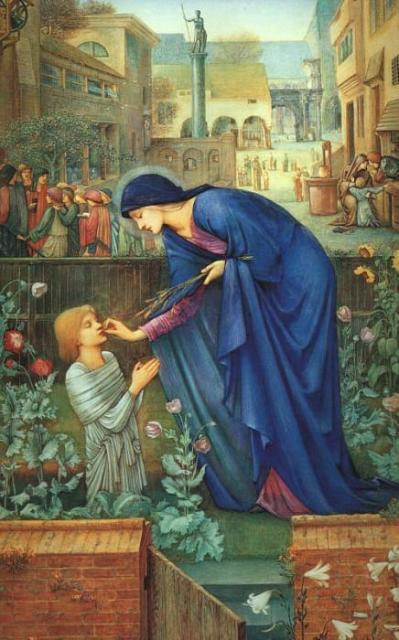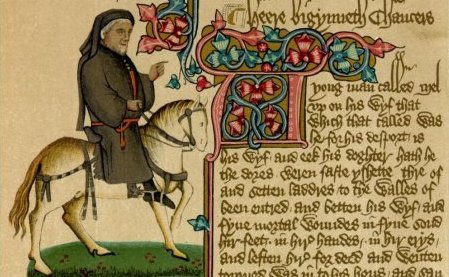Christmas in Sweden - 1940
When Christmas was really White, although it is laced with some Jewish Hollywood propaganda.
When Christmas was really White, although it is laced with some Jewish Hollywood propaganda.
 The Prologue to the Prioress’s Tale
The Prologue to the Prioress’s Tale
Domine dominus noster: O Lord, our Lord (Psalm 8)
‘O Lord, our Lord, your name how marvellous
It is, far spread in this great world!’ quoth she,
‘For not only is your praise, most precious,
Celebrated by men of dignity,
But in the mouths of children your bounty
Is celebrated too; for at the breast sucking
Sometimes they’ll display their thanksgiving.
 This story from Geoffrey Chaucer's The Canterbury Tales is often omitted from collections of his work. It is about Hugh of Lincoln, a boy who was victim of the jewish ritual murder of young Christians, a practice believed to be carried down to this very day. For help with many of the medieval English words, see the Middle-English glossary at Librarius.com.
This story from Geoffrey Chaucer's The Canterbury Tales is often omitted from collections of his work. It is about Hugh of Lincoln, a boy who was victim of the jewish ritual murder of young Christians, a practice believed to be carried down to this very day. For help with many of the medieval English words, see the Middle-English glossary at Librarius.com.
| The Prologe of the Prioresses Tale. |
| Domine dominus noster. |
|
|
| "O lord oure lord, thy name how merveillous |
| Is in this large world ysprad," quod she |
| "For noght oonly thy laude precious |
| Parfourned is by men of dignitee, |
5 | But by the mouth of children thy bountee |
| Parfourned is, for on the brest soukynge |
| Somtyme shewen they thyn heriynge. |
|
|
| Wherfore in laude, as I best kan or may, |
| Of thee, and of the whyte lylye flour |
10 | Which that the bar, and is a mayde alway, |
| To telle a storie I wol do my labour; |
| Nat that I may encressen hir honour, |
| For she hirself is honour, and the roote |
| Of bountee, next hir sone, and soules boote. |
|
|
15 | O mooder Mayde! O mayde Mooder free! |
| O bussh unbrent, brennynge in Moyses sighte, |
| That ravysedest doun fro the deitee |
| Thurgh thyn humblesse, the Goost that in th'alighte, |
| Of whos vertu, whan he thyn herte lighte, |
20 | Conceyved was the Fadres sapience, |
| Help me to telle it in thy reverence. |
|
|
| Lady, thy bountee, thy magnificence, |
| Thy vertu, and thy grete humylitee, |
| Ther may no tonge expresse in no science, |
25 | For somtyme, lady, er men praye to thee, |
| Thou goost biforn of thy benyngnytee |
| And getest us the lyght, thurgh thy preyere, |
| To gyden us unto thy Sone so deere. |
|
|
| My konnyng is so wayk, O blisful Queene, |
30 | For to declare thy grete worthynesse, |
| That I ne may the weighte nat susteene, |
| But as a child of twelf monthe oold, or lesse, |
| That kan unnethes any word expresse, |
| Right so fare I; and therfore I yow preye, |
35 | Gydeth my song that I shal of yow seye." |
|
Racial and National IdentityBy Rev. William P. GaleRacial and National Identity This booklet has been prepared for Christians in the hope that it will provide a better understanding of the Holy Scriptures. As Jesus preached the Gospel of the Kingdom, we emphasize the fact that a Kingdom is a GOVERNMENT. In support of position, we return to a prophecy of Isaiah in Chapter 9, vs.6-7; Chapter 22, vs.21 and the fact that the Constitution of the United States is a Christian government known as a Constitutional Republic. Since Jesus preached the Gospel of the Kingdom, it seems necessary that we clarify the so-called “Gospel of Salvation.” The Apostle Paul is very learned on the subject of salvation and writes much concerning the matter. Where Paul is very learned on the subject of salvation and writes very much concerning the matter. Where Paul writes about salvation, there are passages relating to the “Gospel.” Theologians have therefore “interpreted” that the Gospel referred to by Paul is the Gospel of Salvation. Paul did preach Jesus Christ, therefore Paul must have preached the “Gospel” that Jesus said to preach (See Matt. Chap. 4, vs. 23; Chap. 9 vs. 35; Mark, Chap. 1, vs. 14 and Luke, Chap. 4 vs. 43.)
King Alfred Of England by Jacob Abbott
Entered, according to Act of Congress, in the year one thousand eight hundred and forty-nine, by Harper & Brothers, In the Clerk's Office of the District Court of the Southern District of New York. PREFACE.It is the object of this series of histories to present a clear, distinct, and connected narrative of the lives of those great personages who have in various ages of the world made themselves celebrated as leaders among mankind, and, by the part they have taken in the public affairs of great nations, have exerted the widest influence on the history of the human race. The end which the author has had in view is twofold: first, to communicate such information in respect to the subjects of his narratives as is important for the general reader to possess; and, secondly, to draw such moral lessons from the events described and the characters delineated as they may legitimately teach to the people of the present age. Though written in a direct and simple style, they are intended for, and addressed to, minds possessed of some considerable degree of maturity, for such minds only can fully appreciate the character and action which exhibits itself, as nearly all that is described in these volumes does, in close combination with the conduct and policy of governments, and the great events of international history.
Charter of Liberties 1100Charter of Liberties 1100 Charter of Liberties of Henry I, 1100
This website is a project of Christogenea.org For Christogenea books and other merchandise, visit our page at Christogenea.com. |